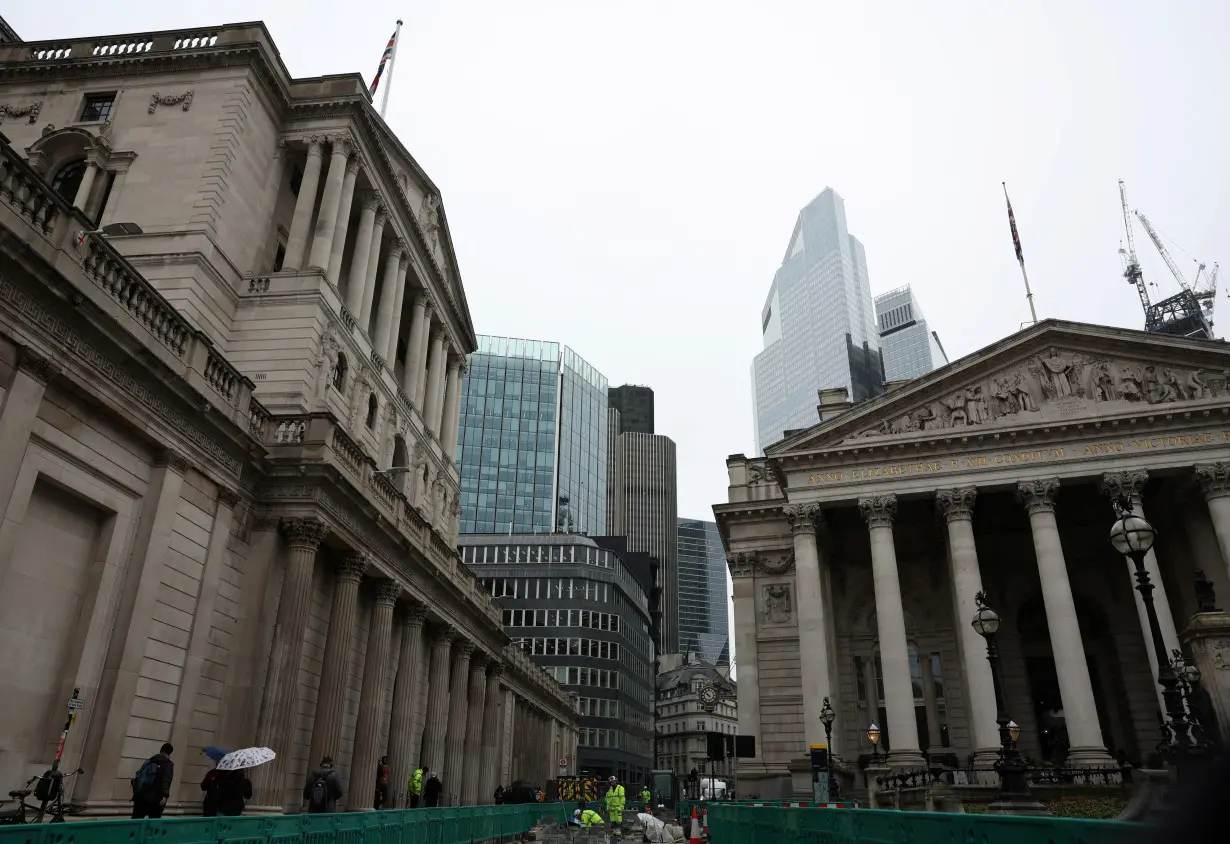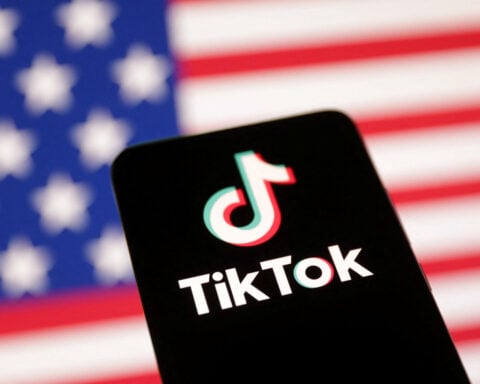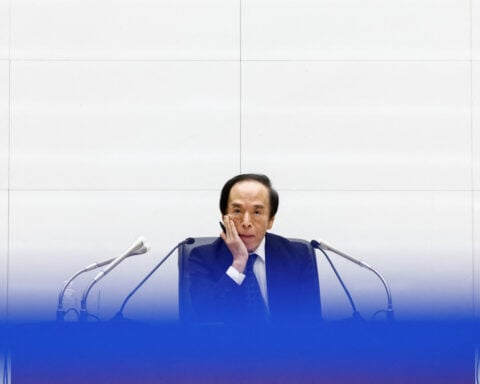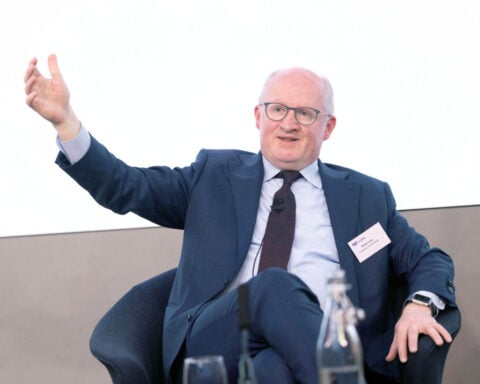LONDON (Reuters) - Britain's once towering inflation rate looks set to fall close to the Bank of England's 2% target on Wednesday, but it may be other figures in the data that influence the BoE's decision on when to cut interest rates for the first time since 2020.
Much of the drop in headline consumer price inflation - from a peak of 11.1% a year and a half ago - is due to falling energy prices which are beyond the BoE's control.
Its policymakers are more interested in price pressures generated within Britain's economy, especially its still tight labour market where many employers continue to push up pay at a rate that could keep inflation hot.
As well as businesses and home-owners stretched by the highest borrowing costs since 2008, Prime Minister Rishi Sunak is also hoping for a drop in inflation pressures that could allow the BoE to cut rates, offering a electoral lifeline to his Conservatives before an election later this year.
BoE Governor Andrew Bailey has said a first rate cut could come as soon as next month, depending on the data.
IS THE INFLATION CRISIS OVER?
Inflation in Britain peaked higher than in any other big rich economy. For a period it was an outlier in the Group of Seven due to a combination of the energy price surge and a shortage of workers to fill jobs, a problem seen in other countries but compounded in Britain by Brexit.
Britain's inflation of 3.2% in the 12 months to March remained higher than in Germany, France and Italy. But it was lower than 3.5% in the United States.
Economists polled by Reuters say Wednesday's data will probably show headline inflation slowed sharply to 2.1% in April although it is likely to pick up a bit later in 2024. The BoE thinks it will speed up again to around 2.6% later this year.
Analysts will be just as focused on other price measures in the April data, chief among them services inflation which at 6.0% in March remains a big concern for the BoE.
LABOUR MARKET PRESSURES
For services firms, wages are a bigger share of costs than for other companies. So the recent 6% pace of annual wage growth in Britain - driven by a more acute shortage of workers to fill roles than in many other economies - has pushed up prices in the sector.
There have been some recent signs that the labour market heat is cooling. The imbalance between a high number of vacancies and a low number of unemployed people - a key gauge for the BoE - is its narrowest since before the COVID pandemic.
COMPANIES FINDING IT HARDER TO PUSH UP PRICES
Something else the BoE is watching closely is the ability of companies to pass on higher costs to customers in the form of higher prices. The BoE's regional agents say that will be harder this year than in 2024.
Megan Greene, one of the nine Monetary Policy Committee members, last week pointed to similar signals from purchasing manager index reports which have shown stronger inflation in prices paid by firms than in the prices they charge.
NEXT ROUNDS OF DATA
After Wednesday's inflation figures for April, there will be a set of official labour market data on June 11 and May's inflation release on June 19 before the BoE's next scheduled policy announcement on June 20.
Due to the problems with the official jobs data, the BoE will watch other gauges of the market even more closely than usual, including PMI surveys due on Thursday this week.
WHEN DOES THE MARKET EXPECT A RATE CUT?
Rate futures on Monday were pricing a roughly 56% chance of the BoE cutting Bank Rate to 5% from 5.25% next month and an almost 100% chance of a cut by its August meeting.
Economists polled by Reuters last week were also split about the timing of the BoE's first move but with a narrow majority seeing it coming later than investors do: of 71 analysts who took part in the poll, 38 expected a first cut in August while 31 pointed to June. Two predicted it would come in September.
(Writing by William Schomberg; Editing by Christina Fincher)

 Michigan Gov. Gretchen Whitmer, a potential 2028 candidate, wants to find common ground with Trump
Michigan Gov. Gretchen Whitmer, a potential 2028 candidate, wants to find common ground with Trump
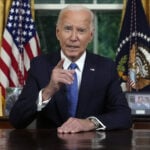 Biden promised to turn the page on Trump. Now he's being replaced by him
Biden promised to turn the page on Trump. Now he's being replaced by him
 Firefighters prepare for increasing gusts following brief reprieve for LA area
Firefighters prepare for increasing gusts following brief reprieve for LA area
 Nippon Steel wants to work with Trump administration on US Steel deal, Mori tells WSJ
Nippon Steel wants to work with Trump administration on US Steel deal, Mori tells WSJ
 After cable damage, Taiwan to step up surveillance of flag of convenience ships
After cable damage, Taiwan to step up surveillance of flag of convenience ships
 BOJ will raise rates if economy, price conditions continue to improve, Ueda says
BOJ will raise rates if economy, price conditions continue to improve, Ueda says
 Manatees congregate in warm waters near power plants as US winter storms graze Florida
Manatees congregate in warm waters near power plants as US winter storms graze Florida
 AAPI adults prioritize immigration, but split on mass deportations: AP-NORC/AAPI Data poll
AAPI adults prioritize immigration, but split on mass deportations: AP-NORC/AAPI Data poll
 As Los Angeles burns, Hollywood's Oscar season turns into a pledge drive
As Los Angeles burns, Hollywood's Oscar season turns into a pledge drive
 As fires ravage Los Angeles, Tiger Woods isn't sure what will happen with Riviera tournament
As fires ravage Los Angeles, Tiger Woods isn't sure what will happen with Riviera tournament
 Antetokounmpo gets 50th career triple-double as Bucks win 130-115 to end Kings' 7-game win streak
Antetokounmpo gets 50th career triple-double as Bucks win 130-115 to end Kings' 7-game win streak
